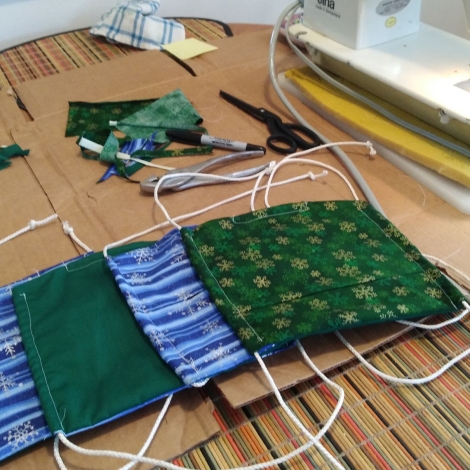Much has been made of the ecological silver lining of the coronavirus pandemic, the steep drop in carbon emissions, but the disease, and our behavior in its wake, have exacerbated other environmental problems. One important issue now is a rise in certain types of plastic waste. Global reports decry alarming volumes of single-use disposable items such as masks, gloves and hand sanitizer bottles washing up on beaches alongside the usual plastic bags, bottles and cups. And this is only the waste not making it to over-burdened recycling plants or landfills.
The priority now is public health, and with that we do need to make allowances. The zero waste movement, which has picked up pace over the past few years, has had some difficulty trying to navigate these new circumstances.
Zero waste is a set of principles aimed at reducing waste as much as possible, and being mindful of the impact our consumption has on the planet. The “Five Rs” concept of zero waste, in order of priority, are Refuse, Reduce, Reuse, Recycle, Rot. Say no to items you don’t need, especially single-use plastics, reduce your overall consumption, reuse what you can and try to fix anything that breaks. Whatever you can’t refuse or reuse, recycle or compost.
In the midst of the new challenges we face during the pandemic, there are some ways you can reduce your waste. Here are eight suggestions.
Use reusable cloth masks
Make sure to follow the guidelines for wearing them, taking them off and keeping them clean. You can make one yourself from old materials using either sew or no-sew methods with instructions available online. Or source them from local or online stores, many of which are donating profits to charitable causes.
Stick with bar soaps
Bar soaps are just as effective, but more sustainable than liquid soap and hand-sanitizer. If you wash your hands frequently, as advised, you should also be able to avoid the use of disposable gloves (with exceptions for healthcare workers and others).
Try to support local zero-waste/refill stores
Many of the zero-waste stores may not be operating as normal, but they probably have alternative measures in place. My local store is taking extra hygiene measures for their staff who will fill bulk paper bags (which can then be reused as bags for grocery shopping, for upcycling projects or can be recycled).
Use reusable containers for takeaway food
Some businesses will still accept reusable cups and containers, since experts have now deemed them to be safe. If you can, try to make the most of these shops and send your business their way.
Buy loose fruits and vegetables
Reducing the number of shopping trips you make is strongly recommended to reduce the risk of virus transmission. It took me some extra work to find the best store closeby for all our loose produce needs as well as other staples, but it was well worth the work as the savings on plastic waste are huge. Be careful not to offset the plastic savings with transport emissions though!
Research and source sustainable items
Not all of us are lucky enough to find ourselves with extra time during lockdown, but for those of us who do, we can use this time to research and experiment with more sustainable and low-waste alternatives to day-to-day items such as toiletries, cleaning products and cosmetics. For some, this could be the perfect time to try water-only hair washing, natural deodorants or making your own reusable cotton pads or kitchen towels. Here is a list of some alternatives to get you started.
Hold onto your clearout items
Store your giveaways until the places that take them reopen. If second-hand stores are closed and clothing banks on the street are not being emptied, your donations will only get damaged if they are left lying out. Do some research on local charities still accepting donations, and if it looks as though charity and thrift stores will be overwhelmed with donations then consider listing items on local buy-it-now or free sharing websites and apps for others to benefit from your items. (And look forward to shopping for others’ clearout items when second-hand stores re-open!)
An unforeseen Zero-Waste win of the pandemic… bidets!
As toilet paper supplies fell victim to panic buying, countries that are more dependent on the not-so-sustainable consumable finally caught up with alternatives as bidet sales skyrocketed.
Zero waste is a journey
I started my journey to reduce waste around two years ago now, after learning more about recycling and the shortcomings of the process in the United Kingdom. Along with countries like the United States, we export much of our plastic waste to low- and middle-income countries that don’t always have the infrastructure and capacity to deal with imported recyclables. Studies have shown that this plastic pollution is a burden on the environment and damaging to human health in areas where the waste is dumped. I came to the realization that the positive impact I thought I was having when filling up my recycling bin rather than general waste wasn’t quite what I’d thought. I still have some way to go in my zero waste journey, but so far I have found it an eye-opening, rewarding and creative process.
With resurgences of the virus worldwide and new guidance and regulations in place, the rist in the consumption of single-use items to fight COVID-19 is a problem that will not be going away soon. It is more important than ever that we are mindful of our waste and the impact it has on the planet, while staying safe. In fact, for some, lockdown can be a great time to research and experiment with zero waste ideas.
About the Author
Elizabeth Collins is an E4C Research Fellow with a background in mechanical engineering and manufacturing. She has worked to provide sustainable energy to developing communities in Peru with the WindAid Institute and volunteers with local non-profits.


There is one recently acknowledged Green Anti Covid fabric called ABACA from Phillipines. It’s same plant family as ordinary Banana tree & i wondered the Banana species found here in Kenya could have same molecular fiber properties as Abaca? If so here in rural areas we are wasting a potential anti single use tool in this Pandemic era.